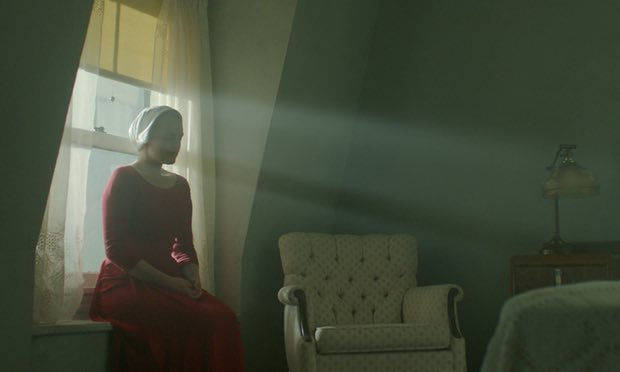The Handmaid's Tale, Hulu, episodes 1 - 3
- carmillavoiez

- Apr 28, 2017
- 4 min read

Bag of shite!
I had such high hopes for Hulu's The Handmaid's Tale. I loved Margaret Atwood's book when I read it years ago. I must read it again to check that the source material has simply been badly used, as I suspect. The actors chosen excite me – especially Top of the Lake's Elizabeth Moss, but even fine acting cannot bring this adaptation to where it needs to be.
What seems to have happened, if my memory serves me well, is that to increase shock value Hulu have condensed the timeline of this dystopia to a handful of years. The main characters are taken from a world where women are, for all intents and purposes, relatively free. A couple of years later the same women are prisoners, wives, servants and breeding stock. An argument could be made that this is where we are now. That we fool ourselves into thinking otherwise by taking out of all proportion small acts of kindness. The most powerful scenes in the first three episodes are already part of women's reality. We are constantly betrayed by small acts of kindness – the “I'll take care of you”s. The walk to a train station by a big strong man, to protect you from harm. The moment in the back of a truck where you can hold hands with your lover, before she is executed in front of you. When a man who is raping you invites you to play scrabble. When someone who has betrayed you brings an icepack for your bruise. These are powerful moments. This is what works in the show.
What doesn't work are the bizarre music choices. Those strange upbeat tunes throw even the sense of horror into disarray. The speed at which society changes without populist agreement. The idea that because a crowd is fired upon the world stops fighting. That women will allow their children to be taken with minimum resistance. That precious breeding stock will be so abused. The show tells us society's problem – lack of fertility, then treats the given scenario as though it is a logical solution. In fairness it's the same kind of logic that allows people who claim to be anti-abortion to also want to limit access to contraception. It is that sort of bizarre American Christian mentality taken a few steps further.
In The Handmaid's Tale there are two types of rape – the rape where the woman is to blame for being provocative – for this women shame each other at the red centre; and rape that is sex not sanctioned by the state, for which the participating male is executed. What happens between powerful men and their sex slaves is not considered rape at all. Even the way those scenes are filmed attempts to invoke some level of sympathy and respect. It is functional, not brutal or painful. It doesn't feel real. I'm sure it did in the book, but Hulu have missed the target here by miles.
Yes there are guns. The threat of violence is ubiquitous. Women, as happens now, police other women even more ardently than men do. But, unlike now, all that's left to be lost is life. The comforts are gone. Class boundaries are everything. This is the sort of society it would take generations to perfect. Check out my recent review of “Swastika Nights” for a different vision of the same subject. There the cages are real and are more believable because of this, but there the problem isn't infertility, at least not at first.
The problem of lack of fertility, that the show revolves around, is tackled in an overly complicated way that is unnecessarily sexual. The handmaids are supposed to be breeding stock. If this is true then artificial insemination, good diet and comfortable environment would be far more productive. Instead we have what is essentially sex slavery. Rich and powerful men possess one infertile wife and one fertile concubine. The infertile wife buys into this by role-playing every stage of conception through to birth. They appear to be privileged, at least in regards to the other women in society, but surely they are intelligent enough to see how illusory their privilege is. These are highly educated women. We haven't moved past the first generation. So when faced with the "ceremony" their euphemism for state sanctioned rape, they feel jealous of their husband's penetration of the servant and the servant's fertility. This jealousy is shown frequently in the show. It is a reason cited for cruelty. And it is often true that when we feel used and abused as humans we take it out on those less powerful. But to do this and celebrate the blessing of motherhood by proxy … they must be taking a lot of drugs to deal with that cognitive dissonance.
So a show that should have been fearfully feminist isn't shocking at all. I think that's what bothers me the most. How easy it is to watch. And I feel let down, especially after my initial squee moment when I spotted Margaret Atwood's silhouette at the red centre.
With seven episodes still to go the show has time to redeem itself. But can we lose Offred's audible thoughts? Are they really necessary? Occasionally they create a humorous moment, but most of the time it smells like lazy writing.
The Week's, Lili Loofbourow discusses the culture in which Hulu's The Handmaid's Tale is produced and its fear of calling anything feminist - http://theweek.com/articles/694919/how-hulus-handmaids-tale-succumbed-feminist-curse – which might explain some of the choices Hulu have made here.




Comments